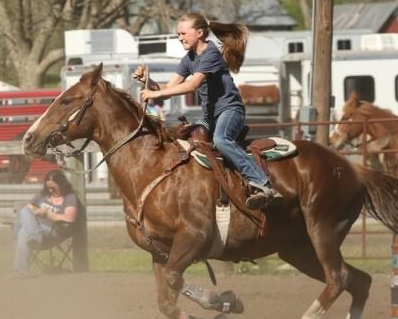“The show will go on.”
That’s the decision made by the majority of committees with scheduled rodeos sanctioned by the Professional Rodeo Cowboys Association.
With coronavirus issues creating utmost health concerns across the country and around the world, many events are at a standstill.
Major athletic competitions, many schools and universities as well as public activities even businesses have been canceled or postponed indefinitely.
As one of the popular spectator sports attracting vast diverse spectator attendance, rodeo is affected as well.
Rodeo headlines recently informed that the Houston Livestock Show in Texas was canceled. Already several go-rounds of one of the year’s highest paying rodeos with total purse of $1.79 million had been completed.
Soon following, Rodeo Austin, also in Texas, and likewise a major payback competition for professional cowboys, was canceled too.
Yet, those cancellations are in contrast to decisions of the majority of professional rodeo committees late last week.
Of the nearly 70 PRCA rodeos scheduled for the rest of March and April, most were still planned.
As of March 13, only seven professional rodeos had been canceled and another seven rodeos had been postponed.
However, PRCA officials remained most attentive to the serious health concerns issuing multiple updates to committees, contestants and fans.
On March 12 Scott Dorenkamp, PRCA livestock program and government relations manager, reiterated causes for concern.
“The coronavirus COVID-19 is responsible for the current outbreak affecting many countries worldwide,” Dorenkamp reviewed.
Common symptoms of coronavirus are coughing, difficulty breathing and fever with incubation period between two to 14 days.
“Infections can cause severe symptoms and in some cases have been fatal in people with weakened immune systems,” Dorenkamp said. Most susceptible are older people and those with long-term conditions like diabetes, cancer and chronic lung disease.
“Health and safety of athletes, officials, fans and event hosts are the Professional Rodeo Cowboys Association’s first priority,” Dorenkamp promised.
“The PRCA is monitoring information on coronavirus from health authorities and assessing the possible impact on rodeo families,” he said.
Dorenkamp verified the PRCA will continue to partner with committees to organize events as planned until given a specific directive from the public health authority in the relevant region indicating otherwise.
“The objective is to host all events. Ultimately this is not a decision of the PRCA,” Dorenkamp said. “The PRCA policy, with our committees, is to continue to monitor the situation following advice of public health authorities.”
Reminder was issued of the bio-security measures which should be taken for protection from the coronavirus.
“The general equine coronavirus and the COVID-19 virus are two distinct viruses,” Dorenkamp said. The general equine strain is spread through infected fecal matter that is ingested by other equines.
“Bio-security prevention measures include isolation of any infected equine until a fecal sample confirms the equine tests negative,” he noted. “Wash and disinfect all tack, buckets, and trailers to lower the risk of transmission.
“Regarding the COVID-19 virus, there is no evidence of transmission from human host to an equine,” Dorenkamp said. “At the present time, there is no evidence that equines can be infected by the COVID-19 virus.”
There is the possibility that a horse as well as tack could carry the COVID-19 virus the same as a doorknob.
“Any of those items which an infected or suspected human host comes in contact should be properly sanitized,” Dorenkamp advised.
Standard biosecurity should be used including frequent hand washing. “Avoid contact with others if you are confirmed with COVID-19 and avoid contact with infected people,” Dorenkamp said. “When sneezing or coughing, use a tissue or do so into your elbow.
“The risk of infection is being reported as low,” Dorenkamp emphasized.
Houston Livestock Show officials announced the rodeo was canceled on a city directive due to concerns about the coronavirus disease. The rodeo began March 3 and was scheduled to conclude March 22.
“Safety and well-being of our guests and our community is our top priority,” Houston officials said.
Echoing that action, Rodeo Austin and Travis County officials said 2020 events have been canceled.
“Since 1938, Rodeo Austin has been a mission that has brought heritage and entertainment while raising millions for Texas kids. Canceling our event is extremely difficult for fans, volunteers, rodeo athletes, donors, contractors and everyone involved,” Rodeo Austin leaders said.
During an emergency meeting, the Nacogdoches County Pro Rodeo scheduled for March 19 to 21 in Nacogdoches, Texas, was canceled.
Claimed one of the “top five best rodeos in the country,” the decision was made due to the “imminent threat to public safety for the coronavirus outbreak of respiratory illness worldwide.”
The Southeastern Livestock Exposition announced postponement of its 63rd annual rodeo in response to the growing concerns of coronavirus.
Livestock Week was scheduled to take place March 14 to 22 at Garrett Coliseum in Montgomery, Alabama. Officials intend to reschedule the event at a later date in 2020.
The Women’s Professional Rodeo Association is actively involved with the PRCA in sharing the latest information from rodeo committees, communities and health officials.
“Although this is a challenging time, understand that both associations are working in the best interest of all,” WPRA leaders said.
However, bull riding still continued in one locale. The Professional Bull Riders hosted competition in Duluth, Georgia, without spectators but with TV camera crews. The CBS Sports Network, a cable TV channel, televised the event live Saturday evening.
There were no signs of worry at the Arcadia, Florida, Rodeo for opening day last Thursday. President Don Hall of the Arcadia Rodeo said everything remained on schedule.
Announcer Greg Simas insisted it’s critical the show go on despite the concern for coronavirus.
“The history and the roots from a rodeo like this for 92 years keep the tradition alive,” Simas said.
